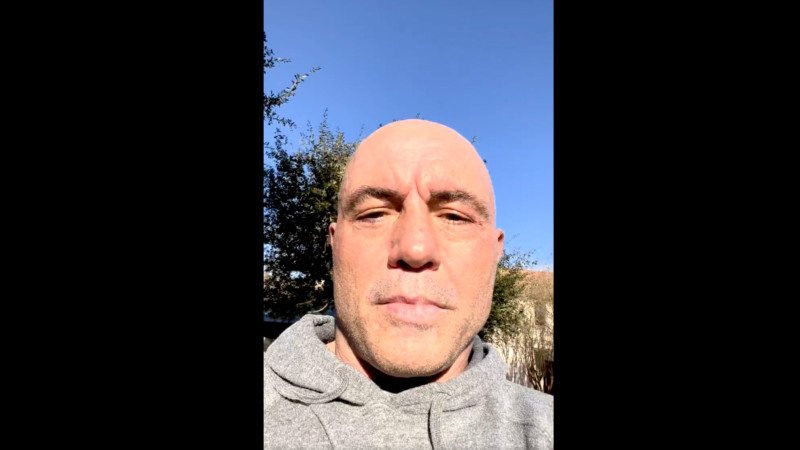The Campaign To Force Joe Rogan Off Spotify Is Already Backfiring
You're talking about him, aren't you?

Democratic politicians, the mainstream media, and progressive members of the Hollywood elite—in short, Team Blue—have designated Joe Rogan as public enemy number one.
Rogan is the reigning king of podcasting: Episodes of his show, which typically last for three hours, are downloaded millions of times. His audience dwarfs everybody else in the commentary business, right, center, or left.
Joe Rogan has completely disrupted the legacy media. pic.twitter.com/rBLCYweag0
— Pomp ???? (@APompliano) January 3, 2022
And they hate him for it—in part because they don't understand him. He doesn't hew closely to a specific political tradition or interest group. He's a supporter of Sen. Bernie Sanders (I–Vt.), but also he thinks the left has gone crazy on transgender issues. He called former President Donald Trump dangerous and many of the former president's supporters "f-ing stupid," but he has also repeatedly challenged the Democratic Party's approach to COVID-19.
This, more than anything else, has made him a target of Team Blue: He is skeptical of covid mandates and has featured guests on his show—Robert Malone, Peter McCullough, Alex Berenson, and others—who have questioned the efficacy of the vaccines. I don't agree with what many of these guests have had had to say, but Rogan evidently believes his audience can benefit from hearing different, clashing points of view. Listeners have the agency to accept or reject what they hear.
Team Blue apparently can't stand this. But they have little power over Rogan. They can't get him thrown off TV or ejected from Facebook, or Twitter, or YouTube. Rogan has a deal with Spotify, and so far Spotify has stood by Rogan—even as liberal music artists have started withdrawing from the platform in protest. Neil Young kicked this off last week, telling Spotify that he would not share the platform with someone who spouted medical misinformation.
There's an irony here, in that Neil Young has a history of spreading bad scientific information. In 2015, he released an entire album, The Monsanto Years, spreading unfounded theories about GMOs.
People should feel free to enjoy Young's music without co-signing every statement he's ever made. Separating the art and artist is a wonderful thing. Except in cases of overwhelming and obvious moral depravity, we can and should generally accept that all people are flawed: We have good qualities and bad qualities, and we can appreciate the good while rejecting the bad.
Various parts of Team Blue, though, are trying to pressure Spotify to rid itself of Rogan. Singer Joni Mitchell announced she is leaving the platform as well. (A rumor that Barry Manilow was quitting Spotify over Rogan is apparently untrue. Manilow said it was false and he has no idea why anyone got that impression.)
The question is whether this will matter to Spotify. On Sunday, the company finally responded to all the anti-Rogan chatter.
"You've had a lot of questions over the last few days about our platform policies and the lines we have drawn between what is acceptable and what is not," wrote the company's leadership. "We have had rules in place for many years but admittedly, we haven't been transparent around the policies that guide our content more broadly. This, in turn, led to questions around their application to serious issues including COVID-19."
Spotify plans to begin adding "content advisory" notes to podcast episodes that are about COVID-19, and it will also make clearer that it prohibits "content that promotes dangerous false or dangerous deceptive medical information that may cause offline harm or poses a direct threat to public health."
That doesn't seem to go as far as the policies of Facebook, Twitter, and other social media platforms, which have tried to label allegedly false covid information as "misinformation," with dubious results. Plenty of perfectly accurate or debatable information has wrongly been smeared as false under these policies, including articles that I have written.
I hope Spotify leaves Rogan alone, because it's the right thing to do. But I also have to wonder how much it would even help the cause of vaccination to remove Rogan from the platform. Censoring him could give him an even larger audience, and more appeal. Vigorously trying—and often failing—to suppress an idea can backfire, making the idea seem exciting, intoxicating, seductive. Rogan would clearly have a gigantic audience, whether with Spotify or on his own. What does it accomplish, exactly, to drive him elsewhere?
Take last week's controversy over the graphic novel Maus, which was removed from a Tennessee school district's curriculum. The immediate effect? A massive spike in online sales.
"Maus" is #2 and #3 on Amazon right now.
— Karen Tumulty (@ktumulty) January 30, 2022
This is the Streisand effect in action: Try to tell people they shouldn't read, discuss, or absorb a book, song, or other piece of content, and you draw people's attention to it. I suspect that's what would happen with Rogan if he exited Spotify; in fact, it's happening right now.
Besides, Rogan's show could be viewed as an opportunity for pro-vaccine advocates. He is obviously willing to have pro-vaccine people on to talk about the issue—Dr. Sanjay Gupta appeared on an episode—and unlike some hosts, he's not likely to do that just to turn them into targets. He's the perfect conduit for reaching a vaccine-skeptical audience. Banishing him eliminates a huge opportunity.
Listen to Rogan's response to the controversy below:
My thoughts on the controversy with @spotify https://t.co/nijJgNSc7m
— Joe Rogan (@joerogan) January 31, 2022


Show Comments (254)